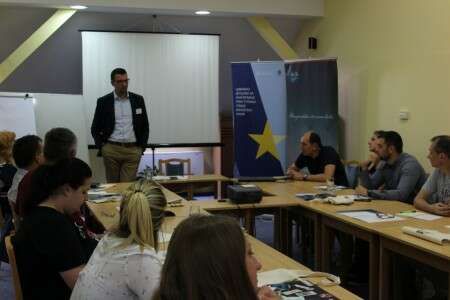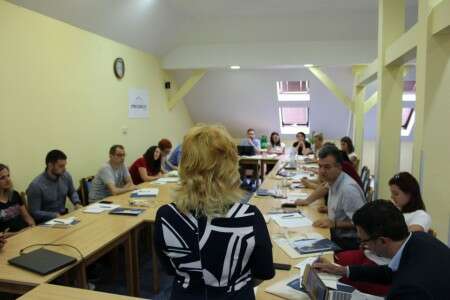Representatives of 20 partner organizations of civil society and media, from 18th to 20th of June 2018, attended a training in Palić, fourth in a row within a project “Civil Society as a Force for Change in the Serbia's EU Accession Process”. Lecturers on the training "Strengthening Program Partners for Participation in Decision-Making: Public Policy and Advocacy" were Srđan Majstorović from European Policy Centre, Vladimir Pavlović and Milorad Bjeletić from Belgrade Open School, Milan Sitarski, a certified trainer for practical policy writing, Mirjana Jevtović from "Insider" and Suzana Stojadinović from the Republic Secretariat for Public Policy.
The main goal of the training was to strengthen capacities of partner organizations and develop potentials to take part in the decision-making processes at the local and national levels. During the three-day training, lecturers passed on their knowledge and skills on how to write and form ideas for practical policies and presented the importance and specifics of public advocacy.
In addition to group lectures and workshops, the participants had the opportunity to work in four smaller parallel sessions where they discussed about their projects and concerns regarding public policies.
Srđan Majstorović, President of the Governing Board of the European Policy Centre, talked about what influence civil society has on on public policies. Participants agreed on the fact that there are major obstacles standing in the way of civil society participation in public policies, but that there lies a big potential which should be supported with CSO activism.
In his first lecture, Vladimir Pavlović, Coordinator of practical policies of Belgrade Open School, discussed with participants about characteristics of the decision-making process and creation process of public policies in Serbia. It was discussed whether this concept is applied, what are the shortcomings and ways to overcome them and how civil society can influence the process of creating public policies in Serbia.
At the Public Policy Analysis workshop, the first group of participants had the opportunity to analyze their public policies and to get feedback. The goal of the workshop was to enable participants to improve their activities on projects that aim to make a concrete changes in individual public policies.
In their joint lecture, Milan Sitarski and Vladimir Pavlović talked about phases of public policy creation – from defining the problem to evaluation. Other topics of the lecture were also conditions under what public policies are developed and applied and in which phases of that process civil society can take part in.
During their workshop, the second group of participants has positioned their practical policy documents with the help of Mr Sitarski and specifically created forms. They’ve received feedback on how precise and focused are their intents and ideas in the document, what can be accomplished with that document, target groups and the ways of placement and promotion of the document.
The third group of participants had the opportunity to speak about public advocacy with Milorad Bjeletic, Executive Director of the Belgrade Open School. He presented the most important steps in the advocacy process, which is a way of influencing decision-makers and the public, and explained the difference between public advocacy and other similar forms of action in society. Using the acquired knowledge, participants applied the mentioned steps on their projects, then presented and talked about draft plans for their projects’ public advocacy and received feedback from other participants and the lecturer.
The fourth workshop was about investigative journalism. The lecturer was Mirjana Jevtović, a member of the investigative journalist team from Insider and she discussed about what the investigative journalism is, which steps should be applied in the research process and how efficient are methods and principles developed by Insider redaction. Participants received guidelines on how to find information sources, how to find necessary documentation and how to use advanced internet search and social networking techniques.
Suzana Stojadinović, Senior Advisor from the Public Policy Secretariat of the Republic of Serbia, during two lectures introduced participants to the provisions of the Law on the Planning System of the Republic of Serbia, related to the consultative process i.e. involvement of civil society organizations, other stakeholders and target groups in formulating and implementing public policies. In the second lecture she pointed out examples of good practice of involving civil society in the process of drafting and adopting regulations and public policy documents.
The project "Civil Society as a Force for Change in the Serbia's EU Accession Process" and its training program aims to support active participation of civil society organizations and media in the process of Serbia's EU accession, through project and institutional support. Belgrade Open School, within the second year of the CS4EU project, has 17 partners from Subotica, Novi Sad, Belgrade, Nis, Prijepolje, Prokuplje, Uzice, Krusevac, Loznica, Valjevo, Pirot, Kragujevac and Arilje. Through this network of organizations and media from all over Serbia, BOS strives to improve the quality of the European integration process and contribute to democratic development in Serbia by strengthening the role of civil society and bringing European integration closer to the citizens. The realization of the three-year project was supported by the Kingdom of Sweden.



